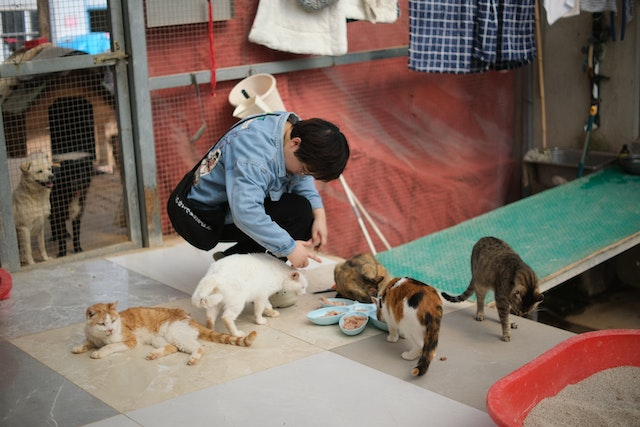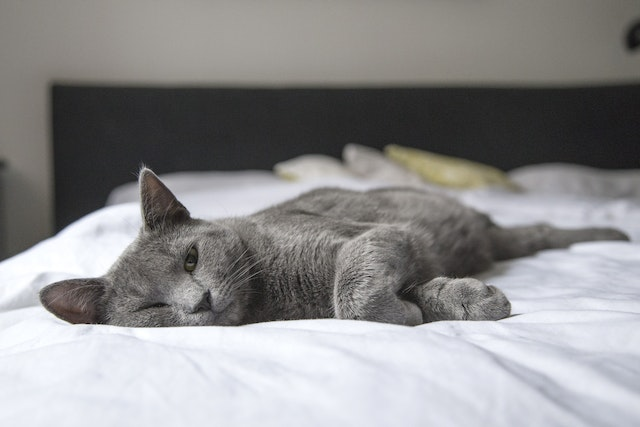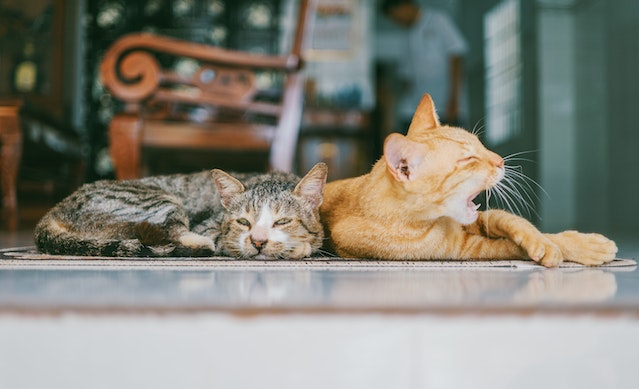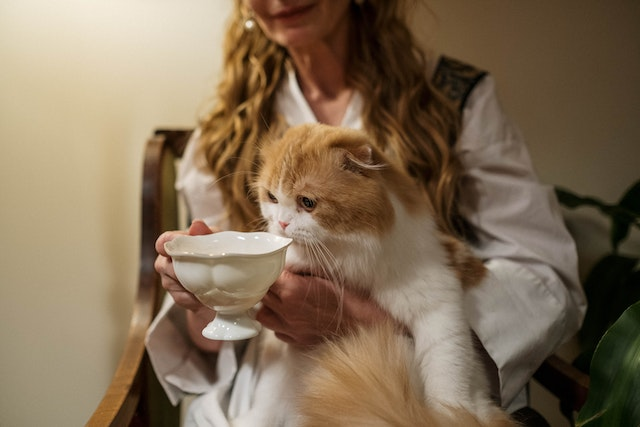
As a pet parent, there is nothing as daunting as finding that your feline friend is dealing with a worm infestation. Trust us; it can be really upsetting.
From annoying roundworms to stubborn tapeworms, these unwelcome creatures can cause various health issues for your pet. Your cat can face vomiting, diarrhea, malnutrition, and anemia.
Fortunately, deworming medications can help remove these intruders from your cat's body. However, as with any medication, you might need clarification about what's safe for your furry friend after the deworming treatment.
One common question you as cat owners might have is whether feeding your cat after deworming treatment is alright.
Today, we will discuss the deworming procedure for a cat, if you can feed your cat after administering the deworming medication, and things to keep in mind after the deworming procedure.
Join us as we explore the best practices for ensuring your cat's health and well-being following deworming treatment.
Let's get right to it.
What Is A Deworming Process For Cats?

Deworming is a vital process that involves giving medication to cats to free their bodies of harmful worms.
These parasites, such as intestinal worms, including roundworms, tapeworms, hookworms, and whipworms, can lead to serious health problems. Your furry pal can face digestive issues, weight loss, and other conditions that could be life-threatening. Therefore, taking preventative measures and treating infestations quickly is crucial to safeguarding your feline friends' well-being.
Deworming medications effectively kill all the worms inside the cat's body and prevent them from reproducing, thereby breaking the parasite's life cycle.
Although deworming medication can cause side effects in cats, like vomiting, diarrhea, or loss of appetite, these symptoms are typically temporary and should subside within a few days.
To ensure the treatment's success and minimize any adverse effects, it's essential to carefully follow the dosage instructions provided by your veterinarian. This ensures that your cat receives the appropriate amount of medication to eliminate the worms without causing harm. It doesn't take long after deworming your cat to completely get rid of them.
Can I Feed My Cat After Deworming?

Understanding the correct timing and feeding practices in conjunction with deworming medication is crucial to its effectiveness. It is advisable to wait at least an hour after administering the deworming medication before feeding your cat.
This waiting period allows the medication to be absorbed properly without interference from food, thus ensuring that it can effectively eliminate the adult worms present in your cat's system.
Feeding your cat immediately after deworming medication could lead to the expulsion of the medication before it can take action against the worms. Additionally, some infected animals may experience nausea or vomiting if they eat too soon after taking the medication. This can be avoided by waiting for the appropriate time.
Remember that the waiting period might vary depending on the specific type of deworming medication prescribed for your cat. Always adhere to the instructions provided by your veterinarian or those stated on the medication label to ensure the correct timing and dosage.
Offering small, easily digestible meals and fresh water throughout the day can help prevent any potential digestive issues that may arise after deworming. Ensuring that your cat stays well-hydrated and providing a balanced diet will aid their healing process and overall well-being.
A bland diet is usually recommended for cats that undergo the deworming procedure. Boiled chicken, fish, scrambled eggs, boiled rice, or mashed potatoes are all fantastic options as they are nutritious while being easy on the stomach. However, avoiding fatty or spicy foods is crucial as they can cause stomach upset.
Furthermore, keeping a close eye on your cat's behavior and health after you eliminate worms is essential. Watch out for any potential side effects, such as lethargy or loss of appetite, and promptly consult your veterinarian if you have any concerns.
By following these guidelines and providing attentive care, you can ensure that your feline friend remains healthy and free from the burden of parasitic infection of worms.
By taking all the appropriate precautions and offering attentive care, you can ensure your beloved furry friend stays healthy and happy after their deworming treatment.
Things To Keep In Mind after Deworming

After deworming your cat, there are several essential things to keep in mind. This will help ensure your pet's well-being and maximize the effectiveness of the treatment.
Here are some key points to consider:
-
Post-Treatment Waiting Period
You need to wait at least an hour after giving deworming medication to feed your adult cats. This time allows the medication to be adequately absorbed into its system without interference from food, ensuring its optimal effectiveness in eradicating the worms.
By adhering to this waiting period, you can be confident that the deworming treatment will have the best chance to work effectively. And it will help your cat get rid of these pesky parasites, promoting their overall health and well-being.
-
Proper Nutrition and Hydration
Give your furry friend soft and easy-to-digest food after the deworming procedure is done. Make sure that your cat eats something before you give them deworming medication.
These meals ensure that their sensitive digestive system isn't overwhelmed and allows them to regain their appetite gradually.
Appropriate hydration is equally important to support their recovery process. Access to fresh water encourages your cat to stay well hydrated, helping flush out any remaining toxins from their body.
-
Monitor for Side Effects
After deworming, active cat monitoring is essential for identifying potential side effects. Cat dewormer can cause common side effects that include mild symptoms like vomiting, diarrhea, lethargy, or temporary loss of appetite.
However, if these side effects persist or worsen, you must seek immediate guidance from your veterinarian. A timely professional evaluation can help rule out any serious complications and ensure your cat receives appropriate care if required.
-
Maintain Good Hygiene
Preventing re-infestation requires strict hygiene practices. Regularly clean your cat's litter box, bedding, and living areas to remove any potential adult worms, worm eggs, or larvae. Dispose of waste properly to avoid contamination.
Washing your hands thoroughly with soap and water after handling your cat, especially after cleaning their litter box, is crucial to prevent the transmission of parasites to humans.
Maintaining a clean living environment and practicing proper personal hygiene protects your cat from re-infestation and safeguards the health of other pets in your household.
-
Follow Up After Deworming Procedure
Your vet might recommend giving your cat additional deworming treatments to ensure all the parasites are gone. It's essential to follow their advice and stick to the schedule they give you.
Don't miss any doses, and complete the whole treatment as directed. Some worms have different life stages; ending the course ensures you target them all. If you stop too soon or skip doses, you risk leaving some worms behind, which could lead to the worms coming back.
So, follow the vet's instructions religiously to keep your cat healthy and free from those pesky parasites.
-
Preventative Measures
Preventing future infestations in your cat involves practicing some measures strictly. One of the most effective ways is to keep your cat indoors.
This significantly reduces their exposure to potential sources of infection, such as contaminated soil or coming in contact with other infected animals elsewhere. Indoor cats are generally at a lower risk of picking up parasites than those allowed to roam freely outdoors.
Maintaining a clean and hygienic living space is equally important in preventing an infestation. Regularly clean your cat's litter box, bedding, and play areas to remove any potential worm eggs or larvae.
Dispose of waste properly to prevent contamination. Vacuum and sweep your home frequently to keep it free from lingering parasites.
Additionally, ensure your cat is updated on their regular health check-ups and deworming treatments as your veterinarian advises. These proactive steps will significantly minimize the risk of future infestations.
Some deworming medications offer protection against multiple types of parasites. Discuss with your veterinarian to ensure your cat receives comprehensive protection as needed.
Final Words!

Caring for our cats' health and well-being includes deworming to eliminate those pesky parasites. After administering deworming medication, it is crucial to wait a bit before feeding your cat to let the medication work its magic.
Offer small, easy-to-digest meals and keep them hydrated to aid their recovery. Keep an eye on them for any side effects, and don't hesitate to contact the vet if needed.
Most importantly, prevention is the key! Keep your furry friend indoors to minimize the chance of picking up parasites. Keep their living area clean and tidy to minimize risks.
Stick to the deworming schedule recommended by the vet to ensure complete elimination. By following these tips, you can provide your feline friend with a healthy and worm-free life! And don't worry about the dead worms. They will eventually pass through the digestive system.
FAQ
Can you deworm a pregnant cat?
Yes, you can deworm a pregnant cat. Still, it's crucial to use safe deworming products for pregnant or nursing cats, as some medications may not be suitable for the kittens. Consulting with your veterinarian immediately is essential to ensure the proper and safe treatment for your cat and her offspring.
What age do I deworm my cat?
You should start deworming kittens when they are 2 weeks old and continue until they reach at least 6 months.
How often to deworm a cat?
For kittens, deworming every 2 weeks to 2 months is advised. Outdoor, shelter, or breeding cats should be dewormed every 3 months or as needed by fecal testing.
An indoor adult cat may be dewormed based on clinical signs or positive fecal testing, with tests every 6 months to a year. Monthly prevention is strongly encouraged for all cats.


0 comments